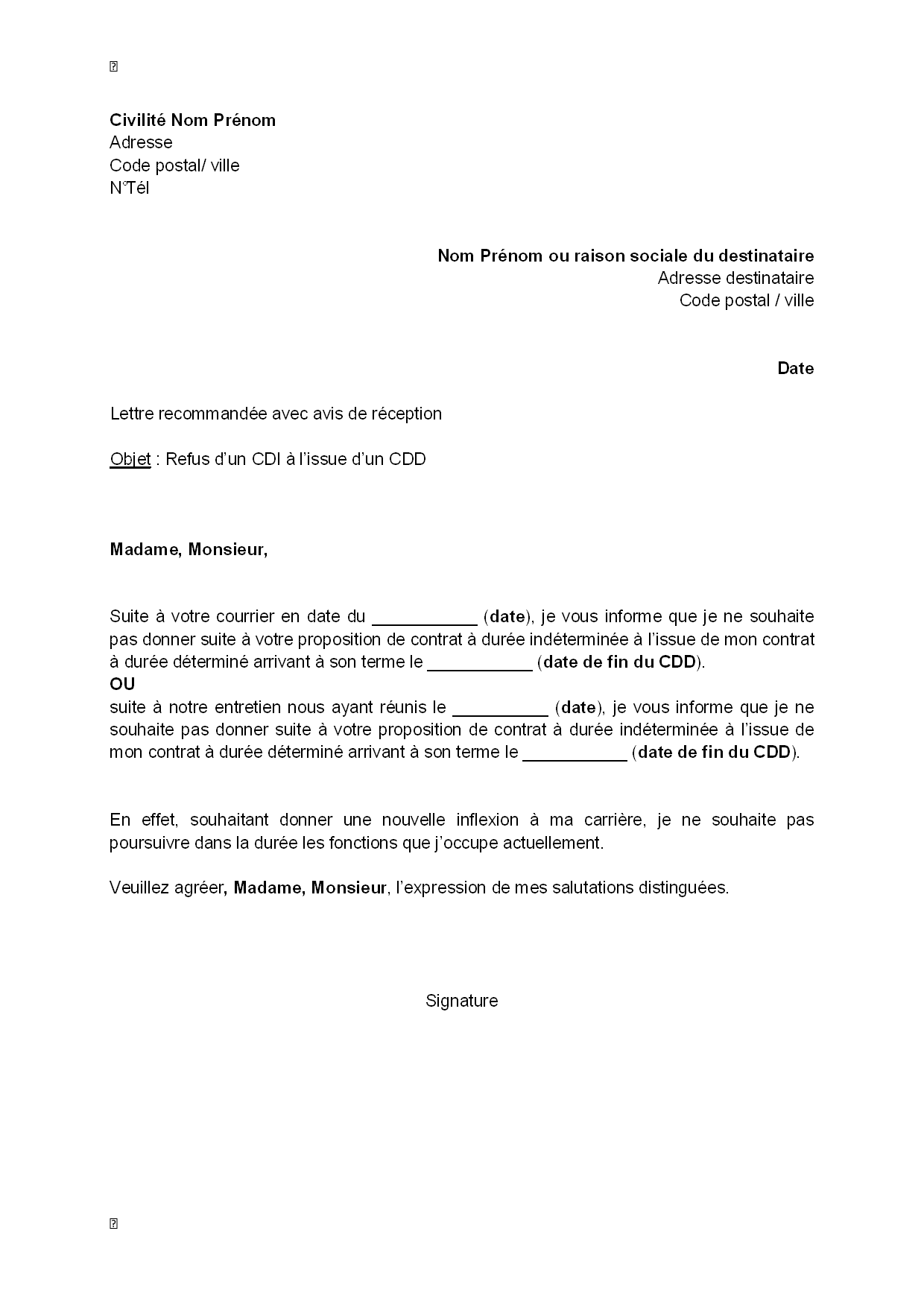How To Quit A Fixed-Term Contract: A Comprehensive Guide
Leaving a fixed-term contract, or CDD as it's known in French, can be both a relief and a challenge. Whether you're looking for better opportunities or simply need a change, understanding the process is key. Quitting a CDD requires careful planning, legal knowledge, and a bit of finesse to ensure you leave on good terms. So, buckle up, because we’re diving deep into this topic!
Now, before we get all fancy with the details, let's break down why this is important. Quitting a CDD isn't just about handing in your resignation letter and walking out. It involves understanding your rights, responsibilities, and the potential consequences of your decision. If done right, it can open doors to new opportunities without burning bridges.
But hey, don’t worry! We’ve got you covered. This article will guide you step-by-step through the process, from understanding your contract terms to crafting the perfect resignation letter. By the end of this, you'll be ready to quit that CDD like a pro!
Table of Contents
- What is a CDD?
- Reasons for Leaving a CDD
- Legal Aspects of Quitting a CDD
- Understanding Your Notice Period
- How to Write a Resignation Letter
- Financial Impact of Quitting a CDD
- Tips for Leaving on Good Terms
- Exploring Alternatives to Quitting
- Frequently Asked Questions
- Conclusion: Ready to Quit?
What is a CDD?
Let’s start with the basics, shall we? A CDD, or Contrat à Durée Déterminée, is a fixed-term employment contract used in France and other countries. It’s like a temporary gig where you work for a specific period or until a particular task is completed. Unlike a permanent contract (CDI), a CDD has an end date, which can range from a few weeks to a couple of years.
But here’s the kicker: even though it’s temporary, quitting a CDD isn’t as simple as just walking out. There are rules, obligations, and sometimes, legal implications to consider. Understanding what a CDD entails is the first step toward making an informed decision about leaving.
Key Features of a CDD
Here are some important aspects of a CDD:
- Defined duration: Your contract will clearly state the start and end dates.
- Specific purpose: A CDD is usually tied to a particular project or role.
- Legal protections: You still have certain rights as an employee, including paid leave and social benefits.
Reasons for Leaving a CDD
So, why would you want to quit a CDD in the first place? There are plenty of reasons, and they’re not all bad. Sometimes, it’s about seeking better opportunities, while other times, it’s about personal circumstances. Here are some common reasons:
Maybe you’ve landed a better job offer, or perhaps you’re pursuing further education. It could also be that the work environment isn’t a good fit for you, or you’ve decided to take a break from the workforce. Whatever your reason, it’s important to be clear about it, both for your own peace of mind and when communicating with your employer.
Personal vs. Professional Reasons
Let’s break it down into two categories:
- Personal reasons: Health issues, family obligations, or relocation.
- Professional reasons: Career advancement, better pay, or dissatisfaction with the current role.
Legal Aspects of Quitting a CDD
Alright, now let’s talk about the legal stuff. Quitting a CDD isn’t as simple as just packing up and leaving. There are legal obligations you need to fulfill to avoid potential penalties or disputes with your employer. Here’s what you need to know:
First off, check your contract. It should outline the terms and conditions for termination, including any penalties for early departure. If you’re unsure, consult an employment lawyer or seek advice from a labor union. Trust me, it’s better to be safe than sorry!
Key Legal Points
Here are some important legal aspects to consider:
- Termination clauses: Your contract may specify conditions for early termination.
- Compensation: In some cases, you might be entitled to severance pay or other benefits.
- Penalties: Be aware of any financial penalties for leaving before the contract ends.
Understanding Your Notice Period
One of the most critical aspects of quitting a CDD is understanding your notice period. This is the amount of time you’re required to give your employer before leaving. It’s usually specified in your contract, but if it’s not, there are standard notice periods based on your length of service.
For example, if you’ve been with the company for less than a year, your notice period might be two weeks. If you’ve been there longer, it could be up to a month. Always check your contract or consult with HR to confirm.
How to Calculate Your Notice Period
Here’s a simple guide to calculating your notice period:
- Less than 1 year: 2 weeks
- 1-2 years: 1 month
- More than 2 years: 2 months
How to Write a Resignation Letter
Now, let’s get to the heart of the matter: writing your resignation letter. This is your official notification to your employer that you’re leaving, so it’s important to get it right. A well-written resignation letter can help you leave on good terms and maintain a positive professional relationship.
Here’s a basic structure you can follow:
- Start with a polite greeting and state your intention to resign.
- Mention the date of your last working day.
- Express gratitude for the opportunities you’ve had during your time with the company.
- Offer to assist with the transition process, if possible.
- End with a positive note and your signature.
Sample Resignation Letter
Here’s an example of what your resignation letter might look like:
Dear [Employer’s Name],
I am writing to formally resign from my position as [Job Title] at [Company Name], effective [Last Working Day].
I want to express my gratitude for the opportunities I’ve had during my time here. It has been a valuable experience, and I appreciate the support I’ve received from you and the team.
Please let me know how I can assist with the transition process. I’m happy to help train my replacement or complete any outstanding tasks.
Thank you once again for everything. I hope to stay in touch and wish the company continued success.
Sincerely,
[Your Name]
Financial Impact of Quitting a CDD
Leaving a CDD can have financial implications, so it’s important to assess your situation before making a decision. Consider factors like your current savings, any outstanding debts, and your ability to find new employment quickly. If you’re leaving for a better job, make sure the new position offers a comparable or higher salary.
Also, don’t forget about any severance pay or unused vacation days. You might be entitled to compensation for these, so check your contract or consult HR for details.
Financial Checklist
Here’s a quick checklist to help you assess the financial impact:
- Current savings: Do you have enough to cover living expenses while job hunting?
- Severance pay: Are you entitled to any compensation for leaving early?
- Vacation days: Will you be paid for unused vacation days?
- New job prospects: Do you have a new job lined up?
Tips for Leaving on Good Terms
Leaving a CDD doesn’t mean burning bridges. In fact, maintaining good relationships with your employer and colleagues can be beneficial for your future career. Here are some tips to help you leave on good terms:
- Give proper notice: Stick to the notice period outlined in your contract.
- Be professional: Keep your resignation letter polite and respectful.
- Offer assistance: Help with the transition process by training your replacement or completing outstanding tasks.
- Stay positive: Focus on the positive aspects of your experience and express gratitude for the opportunities you’ve had.
Exploring Alternatives to Quitting
Before you decide to quit, consider whether there are alternatives that might work for you. For example, could you negotiate a contract extension or conversion to a permanent position? Sometimes, a simple conversation with your employer can lead to a mutually beneficial solution.
Alternatively, if your reasons for leaving are related to dissatisfaction with your role, could you request a change in responsibilities or working conditions? It’s worth exploring these options before making a final decision.
Frequently Asked Questions
Here are some common questions people have about quitting a CDD:
Q: Can I quit a CDD without notice?
A: Technically, you can, but it’s not advisable. Giving proper notice helps you maintain a positive relationship with your employer and avoids potential legal issues.
Q: Will quitting a CDD affect my unemployment benefits?
A: It depends on the circumstances. If you have a valid reason for leaving, such as a better job offer, you might still be eligible for benefits. Check with your local employment agency for more information.
Q: Can my employer stop me from leaving?
A: No, they can’t physically stop you from leaving, but they may impose penalties if you don’t fulfill your notice period or other contractual obligations.
Conclusion: Ready to Quit?
Quitting a CDD is a big decision, but with the right information and preparation, it doesn’t have to be overwhelming. By understanding your rights, fulfilling your obligations, and maintaining professionalism, you can leave on good terms and move on to new opportunities.
So, are you ready to take the next step? Whether you’re planning to hand in your resignation letter or exploring alternatives, remember to prioritize your future and make decisions that align with your goals. And don’t forget to share this article with anyone who might find it helpful!
Until next time, stay savvy and keep hustling!

Comment quitter un CDD pour un CDI ? Pôle Immo

Quitter un CDI pour un CDD

lettre de refus cdi refus cdi après cdd Aep22